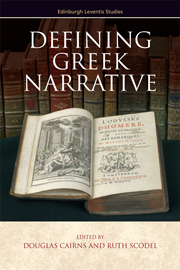Book contents
- Frontmatter
- Contents
- Preface
- Notes on Contributors
- 1 Introduction
- PART I DEFINING THE GREEK TRADITION
- PART II THE DEVELOPMENT OF THE GREEK TRADITION
- 6 Exemplarity and Narrative in the Greek Tradition
- 7 ‘Where do I begin?’: An Odyssean Narrative Strategy and its Afterlife
- 8 Some Ancient Views on Narrative, its Structure and Working
- 9 Who, Sappho?
- 10 The Creative Impact of the Occasion: Pindar's Songs for the Emmenids and Horace's Odes 1.12 and 4.2
- 11 Narrative on the Greek Tragic Stage
- 12 Stock Situations, Topoi and the Greekness of Greek Historiography
- 13 Heliodorus the Hellene
- PART III BEYOND GREECE
- Bibliography
- Index
10 - The Creative Impact of the Occasion: Pindar's Songs for the Emmenids and Horace's Odes 1.12 and 4.2
from PART II - THE DEVELOPMENT OF THE GREEK TRADITION
Published online by Cambridge University Press: 05 September 2014
- Frontmatter
- Contents
- Preface
- Notes on Contributors
- 1 Introduction
- PART I DEFINING THE GREEK TRADITION
- PART II THE DEVELOPMENT OF THE GREEK TRADITION
- 6 Exemplarity and Narrative in the Greek Tradition
- 7 ‘Where do I begin?’: An Odyssean Narrative Strategy and its Afterlife
- 8 Some Ancient Views on Narrative, its Structure and Working
- 9 Who, Sappho?
- 10 The Creative Impact of the Occasion: Pindar's Songs for the Emmenids and Horace's Odes 1.12 and 4.2
- 11 Narrative on the Greek Tragic Stage
- 12 Stock Situations, Topoi and the Greekness of Greek Historiography
- 13 Heliodorus the Hellene
- PART III BEYOND GREECE
- Bibliography
- Index
Summary
Greek melic narratives are on the whole small-scale compositions and as a rule illustrate some aspect of the occasion for which they are composed, which is sometimes specified, sometimes implied and sometimes left totally unclear. In this chapter I focus on the occasion in order to explore the stimulus it offers for the composition of new narratives either for the same or for a related, subsequent occasion.
Pindar's songs for the Emmenids of Acragas will serve as my main test-case because (1) they constitute an interesting sequence of songs which call attention to their occasion, thus allowing assessment of the stimulus it offers; (2) the later songs allude to, rework and creatively integrate the occasions of the earlier songs; (3) the Third Olympian combines two distinct occasions, Theron's Olympic victory in 476 BC and the periodic celebration of the Theoxenia of the Dioscuri in Acragas; and (4) the Second Olympian is the model for Horace's Odes 1.12, which offers a precious comparandum for the catalytic role of Greek occasions on narratives.
In the following discussion I use the term ‘occasion’ in its broad sense, namely agonistic events, festivals, other celebrations and performance contexts. Epinician songs often treat contests and epinician celebrations as separate events. A characteristic example in this category is the much-discussed Tenth Olympian, which opens with a poetic apology for the long time that has lapsed between Hagesidamus’ Olympic victory and the composition of the epinician song. At the other end of the spectrum, there are songs that create a continuum between the victory and the epinician performance.
- Type
- Chapter
- Information
- Defining Greek Narrative , pp. 197 - 225Publisher: Edinburgh University PressPrint publication year: 2014



